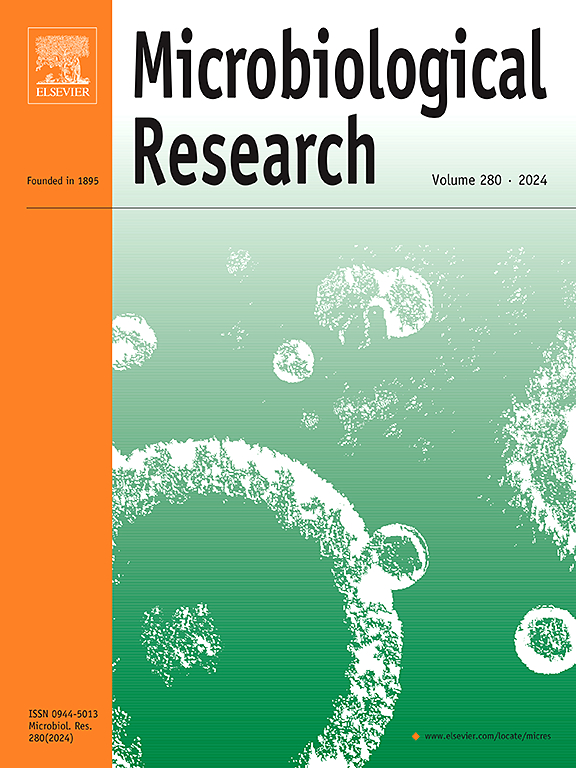Comparative genomics and functional analysis of Rahnella sp. PCH160 revealed metal stress tolerance and plant growth-promotion traits
IF 6.1
1区 生物学
Q1 MICROBIOLOGY
引用次数: 0
Abstract
Heavy metals (HM) are rapidly emerging as the primary pollutants in agriculture, posing significant environmental and health concerns. Employing heavy metal tolerant plant growth-promoting rhizobacteria (PGPR) for the remediation of HM-induced phytotoxicity is a sustainable and effective strategy. This study investigates a putative novel plant growth-promoting rhizobacterium (PGPR) Rahnella sp. PCH160, isolated from the Pangi-Chamba Himalayan region (PCH). Whole-genome sequencing and comparative genomics identified unique genes associated with heavy metal tolerance, phosphate solubilization, siderophore production, nitrogen fixation, and indole-3-acetic acid (IAA) synthesis. The bacterium exhibits exceptional tolerance to heavy metals, even under chemically defined medium, particularly copper (Cu2+) and nickel (Ni2+), as well as multiple plant growth-promoting traits. Additionally, PCH160 showed biocontrol potential through different enzymatic activities. Seed-based bioassays highlighted significant enhancements in root and shoot length and dry biomass under heavy metal stress. This research highlights the promising capabilities of Rahnella sp. PCH160 as both a biofertilizer and a biocontrol agent. There are limited reports of the positive impact of PGPR on plant growth and development in the Himalayan regions. However, to the best of our knowledge, tolerance of PGPR to heavy metals has not been characterized from higher-altitude regions. In conclusion, this study provides insights into sustainable agriculture practices in contaminated soils at high altitudes. It has also demonstrated that a PGPR isolated from the Pangi-Chamba Himalayan region has the potential to enhance plant growth and development in the presence of heavy metal stress.
Rahnella sp. PCH160的比较基因组学和功能分析揭示了Rahnella sp. PCH160耐金属胁迫和促进植物生长的性状
重金属(HM)正迅速成为农业中的主要污染物,引起重大的环境和健康问题。利用耐重金属植物促生根瘤菌(PGPR)修复重金属诱导的植物毒性是一种可持续有效的策略。本研究研究了从Pangi-Chamba喜马拉雅地区(PCH)分离的一种新的植物生长促进根细菌Rahnella sp. PCH160。全基因组测序和比较基因组学鉴定出与重金属耐受性、磷酸盐溶解、铁载体产生、固氮和吲哚-3-乙酸(IAA)合成相关的独特基因。这种细菌对重金属表现出特殊的耐受性,即使在化学定义的介质中,特别是铜(Cu2+)和镍(Ni2+),以及多种植物生长促进性状。此外,PCH160通过不同的酶活性表现出生物防治潜力。基于种子的生物测定结果显示,重金属胁迫下植物的根、茎长和干生物量显著增加。本研究强调了Rahnella sp. PCH160作为生物肥料和生物防治剂的潜力。关于PGPR对喜马拉雅地区植物生长发育的积极影响的报道有限。然而,据我们所知,高海拔地区的PGPR对重金属的耐受性尚未表现出来。总之,这项研究为高海拔地区受污染土壤的可持续农业实践提供了见解。研究还表明,从Pangi-Chamba喜马拉雅地区分离的PGPR具有在重金属胁迫下促进植物生长发育的潜力。
本文章由计算机程序翻译,如有差异,请以英文原文为准。
求助全文
约1分钟内获得全文
求助全文
来源期刊

Microbiological research
生物-微生物学
CiteScore
10.90
自引率
6.00%
发文量
249
审稿时长
29 days
期刊介绍:
Microbiological Research is devoted to publishing reports on prokaryotic and eukaryotic microorganisms such as yeasts, fungi, bacteria, archaea, and protozoa. Research on interactions between pathogenic microorganisms and their environment or hosts are also covered.
 求助内容:
求助内容: 应助结果提醒方式:
应助结果提醒方式:


